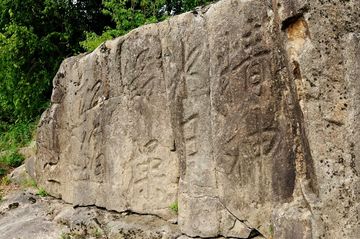창옥병 암각문
| 창옥병 암각문 |
|
| 대표명칭 | 창옥병 암각문 |
|---|---|
| 한자 | 蒼玉屛 巖刻文 |
| 주소 | 경기도 포천시 창수면 옥수로 327번길 198 |
| 지정(등록) 종목 | 포천시 향토유적 제41호 |
| 지정(등록)일 | 1986년 4월 9일 |
| 소유자 | 사유 |
|
|
|
해설문
국문
영평8경의 하나인 창옥병과 그 인근의 바위에 새겨진 글씨이다. 창옥병은 기암괴석이 한 폭의 병풍 같다고 하여 붙여진 이름이다.
암각문은 모두 11점이다. 절벽에는 선조(1567~1608 재위)가 박순(朴淳, 1523~1589)에게 내린 하교인 ‘송균절조수월정신(松筠節操水月精神)’이라는 글씨가 새겨져 있다. 소나무와 대나무처럼 절조가 있고 물과 달 같은 깨끗한 정신의 소유자임을 칭찬한 내용이다. 그 옆에는 ‘산금대(散襟臺)’가 있다. ‘수경대(水鏡臺)’ 옆에는 박순의 「제이양정벽(題二養亭壁)」이라는 시가 김수증(金壽增, 1624~1701)의 글씨로 새겨졌다. 그 외에 토운상(吐雲床), 와준(窪尊), 장란(障蘭), 청령담(淸泠潭), 청학대(靑鶴臺), 백학대(白鶴臺), 옥병동(玉屛洞) 등이 여러 곳에 흩어져있다.
영평은 선조 때 영의정을 지낸 박순이 즐겨 찾던 경승지이다. 선조 19년(1586) 이곳에 자리 잡은 뒤, 여러 빼어난 장소에다 이름을 붙였다. 박순의 「이양정기(二養亭記)」에 보면, 영평에 은거하던 중 바위 등에 이름을 짓고 한호(韓濩, 1543~1605)에게 글씨를 받아서 신이(辛夷)를 시켜 바위에 새겼다고 한다.
영문
Rock-carved Calligraphy of Changokbyeong
There are 11 places on Changokbyeong Cliff and nearby rocks where calligraphy in Chinese characters has been carved into the rock face.
Changokbyeong Cliff, located along the Yeongpyeonghcheon Stream, is one of the eight scenic sites of Yeongpyeong. The name Changokbyeong means "green jade folding screen" and describes the cliff's appearance.
The rocks are said to have been
Most of the inscriptions state the name of the rocks
- 松筠節操水月精神 Integrity like a pine or bamboo; Mind clean like water or the moon. / A teaching given to Bak Sun by King Seonjo (r.1567-1608)
- 散襟臺 Platform of the Open Collar
- 水鏡臺 Platform of the Winter Water
- 題二養亭壁 / A poem by Bak Sun written in the calligraphic style of Kim Su Jeung (1624-1701)
- 吐雲床 Floor of the Exuding Cloud
- 窪尊 Pool of Respect
- 障蘭 Orchid of the Screen / Screen of Orchids
- 淸泠潭 Pond of Clear Awakening
- 靑鶴臺 Platform of the Blue Crane
- 白鶴臺 Platform of the White Crane
- 玉屛洞 Valley of the Jade Folding Screen
The Yeongpyeong area was renowned for its beautiful scenery and it is known that Pak Sun (1523~1589), the Chief Council of the Joseon dynasty (1392-1910), favored this area and named the places of scenic rocks in 1587. According to Pak’s Record of Yiyangjeong, the Pavilion, he named the rocks while staying in Yeongpyeong. It is also believed that the calligraphies were written by one of the great Joseon calligraphers, Han Ho (1543~1605), and were carved by a stonemason called Sin Yi.
